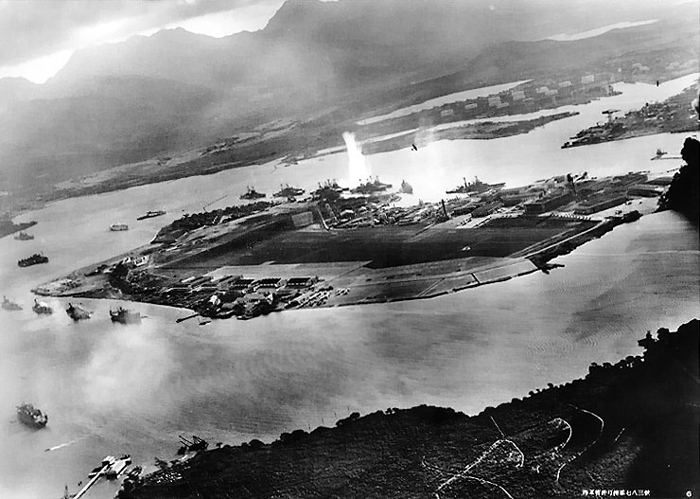Everyday events could make nuclear war seem imminent…

Photograph taken from a Japanese plane during the torpedo attack on ships moored on both sides of Ford Island shortly after the beginning of the Pearl Harbor attack. Official U.S. Navy photograph, 7 December 1941
From The New York Times:
My mother doesn’t remember Pearl Harbor. But she was there. Barely two months old, she spent the raid held tightly by her mother in an improvised bomb shelter, where the two of them had joined some Honolulu neighbors. My Chinese-American grandmother, Grace Lam Katsura, remembered it all her life: the sound of the planes, the klaxons, the confusion. She recalled the explosions, first down in the harbor and then closer, as friendly fire from antiaircraft guns fell on the city. Most of all she remembered the paralyzing suspense she had felt, waiting in the dark and wondering whether the next explosion would claim her life and her baby’s.
Forty years later, she told the story to her panicky grandson. I was 11 and had just learned that Soviet ICBMs could deliver nuclear weapons to targets in the United States, including the military town in California where I lived. In sharing her Pearl Harbor memories, my grandmother meant to reassure me. “What you’re worrying about might never happen,” she seemed to be saying. “At least you’re not waiting under real planes as your mother and I did, while real bombs were falling.”
But in my mind, her memory of Pearl Harbor fused with my terror of nuclear weapons. After all, my own country had already used them against civilians in Japan, the country from which my grandfather’s family had emigrated. That fact made reassurances ring hollow. As long as these weapons exist, I thought, we are all down in that shelter, in perpetual suspense.
As I got deeper into my teens, everyday events could make nuclear war seem imminent. Sudden interruptions in TV or radio programs, even tests of the Emergency Broadcast System, put my heart in my mouth. When a low-flying jet went over, I waited for the blinding flash of a detonating warhead. In every false alarm I saw a premonition of the inevitable true one.
“Waiting for the Bomb to Drop”, Paul Saint-Amour, the New York Times








